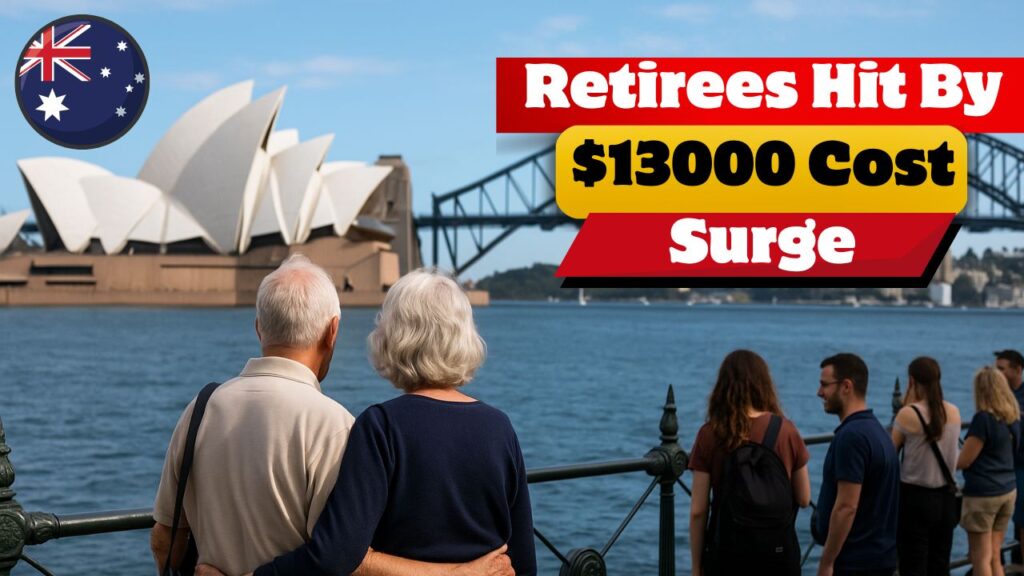Retirees Higher Living Costs in 2025 – Retirees across Australia are facing steep increases in living costs in 2025, with reports suggesting household expenses could rise by as much as $13,000 annually. The new Federal Budget has brought several policy changes affecting healthcare, energy bills, and essential living items that are directly impacting senior citizens. Rising insurance premiums, rent hikes, and everyday grocery costs have all contributed to this financial pressure. This article breaks down what’s changing, how it impacts retirees, and what Australian seniors can do to manage these higher expenses effectively.

Cost of Living Pressures for Australian Retirees in 2025
In 2025, Australian retirees are expected to face the sharpest increase in living costs in over a decade. Energy prices, insurance rates, and food costs have all climbed significantly. According to budget projections, retirees may need an additional $13,000 per year to maintain their current lifestyle. Superannuation income and the Age Pension have not increased at the same pace, putting more pressure on fixed-income households. The Australian government has introduced small rebates and subsidies, but experts warn that these may not fully offset the surge in expenses for older Australians.
 Melbourne Retirees Hit Hard – Annual Living Costs Jump $13,000 in 2025, Here’s What You Need to Know
Melbourne Retirees Hit Hard – Annual Living Costs Jump $13,000 in 2025, Here’s What You Need to Know
Impact of Federal Budget Changes on Senior Citizens in Australia
The 2025 Federal Budget has restructured several programs that directly affect retirees, including energy rebates, medical subsidies, and transport concessions. Although new measures like the Energy Assistance Payment and Healthcare Support Credit aim to reduce pressure, inflation-driven price hikes continue to outpace relief efforts. Senior citizens, particularly those relying solely on the Age Pension, are struggling to manage rising costs for rent, utilities, and medication. Many advocacy groups are urging the Canberra government to introduce further pension indexation or one-off relief payments to help retirees meet essential expenses.
| Category | Average Annual Increase (2025) |
|---|---|
| Housing and Rent | $3,200 |
| Healthcare and Medications | $2,100 |
| Utilities (Gas, Electricity, Water) | $1,800 |
| Groceries and Food | $2,400 |
| Transport and Insurance | $1,500 |
| Miscellaneous Essentials | $2,000 |
Ways for Australian Seniors to Manage Rising Retirement Expenses
Retired Australians can take practical steps to soften the impact of rising costs. Applying for state-based rebates such as the NSW Energy Rebate or Victoria’s Seniors Card discounts can reduce recurring expenses. Seniors should also review their health insurance coverage and utility plans to ensure they are receiving the best available rates. Budgeting tools provided by Services Australia can help retirees adjust to new expenses. Financial advisors suggest that maintaining diversified savings and investing in low-risk options could also provide steady returns that keep up with inflationary pressures in 2025.
Government Relief Programs for Elderly Australians
The Australian government has introduced several targeted relief programs to assist older citizens coping with cost increases. These include the Energy Bill Relief Fund, Commonwealth Seniors Health Card benefits, and higher rental assistance limits. Eligible retirees can apply through Services Australia to access payments or credits directly deposited into their accounts. Despite these measures, advocacy groups continue to call for stronger long-term solutions, including indexing the Age Pension more closely with inflation to ensure retirees are not left behind amid rising national costs.
Frequently Asked Questions (FAQs)
1. Why are retiree living costs rising so much in 2025?
Rising inflation, higher energy prices, and increased healthcare costs are driving up overall living expenses for retirees across Australia.
2. Will the Australian government increase the Age Pension?
While minor pension adjustments are planned, experts believe the current increases may not fully match the rate of cost-of-living inflation in 2025.
3. How can seniors apply for the new cost-of-living relief programs?
Seniors can apply through the Services Australia website or local Service Centre for rebates and assistance payments introduced in the 2025 Federal Budget.
4. Are retirees eligible for extra support from state governments?
Yes, most states offer additional rebates on energy, transport, and health services, which can be combined with federal benefits to reduce overall expenses.



